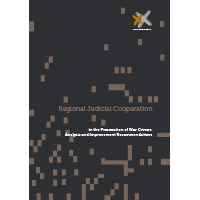Regional Judicial Cooperation in the Prosecution of War Crimes: Analysis and Improvement Recommendations
 In consequence of the cross-border nature of the armed conflicts in the former Yugoslavia, victims, witnesses, perpetrators and evidence are not for the most part located within the territory of a single state and do not fall within the competence of a single national judiciary. Additionally, due to the fact that almost all former Yugoslavia successor states ban the extradition of their own nationals to face trial in other countries, prosecution of war crimes is unthinkable without an effective cooperation among the countries in the region. Given the importance of the fight against impunity for war crimes, regional cooperation is among the key commitments that Serbia undertook as part of its European Union (EU) Accession negotiations.
In consequence of the cross-border nature of the armed conflicts in the former Yugoslavia, victims, witnesses, perpetrators and evidence are not for the most part located within the territory of a single state and do not fall within the competence of a single national judiciary. Additionally, due to the fact that almost all former Yugoslavia successor states ban the extradition of their own nationals to face trial in other countries, prosecution of war crimes is unthinkable without an effective cooperation among the countries in the region. Given the importance of the fight against impunity for war crimes, regional cooperation is among the key commitments that Serbia undertook as part of its European Union (EU) Accession negotiations.
However, cooperation among judicial institutions in the region has never reached its full potential, and has even been stagnating over the past few years. The major barriers to effective regional cooperation are as follows: the issue of universal jurisdiction, trials in absentia, lack of cooperation between the Office of the War Crimes Prosecutor of Serbia with Kosovo justice institutions, and the lack of trust between judicial institutions in the countries of the region.
This paper analyses the existing normative framework for regional cooperation, cooperation mechanisms and challenges hindering effective cooperation, with a view to proposing a set of recommendations for its improvement.
Regional Judicial Cooperation in the Prosecution of War Crimes: Analysis and Improvement Recommendations is available here.






